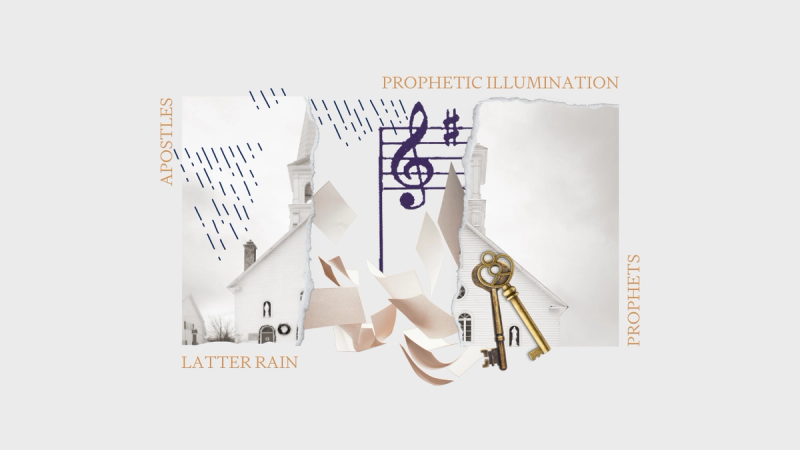Holly Pivec and R. Douglas Geivett are apologists and recognized experts on the New Apostolic Reformation movement. I first met Holly and Doug in 2018 when I was publisher for Lexham Press. We had recently acquired the rights to their first two books on the dangers of this movement. Over the last decade, they have coauthored no fewer than four books on this theme, which are great resources both for learning more about the dangers of the NAR and for passing along to others who may be attracted to or influenced by its teachings: Reckless Christianity, Counterfeit Kingdom, A New Apostolic Reformation?, and God’s Super-Apostles.
Doug and Holly, I remember being completely unaware of the New Apostolic Reformation until I heard about it from you a few years ago. What is this movement, and why should we be concerned?
HP: The New Apostolic Reformation (NAR) is a global movement led by so-called apostles and prophets, who according to NAR beliefs must hold the highest governing offices in the church. The movement’s overall goal is to bring God’s physical kingdom to earth; the reason it hasn’t been able to do this for the past nearly two thousand years is because apostles and prophets have been absent. They alone are authorized by God to give essential new revelation that the church needs to accomplish its mission, including working miraculous powers and raising up an end-time church army to usher in the kingdom.
Of course, classical Pentecostals, charismatics, and all continuationists believe in ongoing miraculous gifts of prophesying, healing, and miracles. But NAR teachings are a radical departure from historical Pentecostal teachings because the movement’s leaders teach that not only the gifts but also the offices and their authority have been restored to the church in our time. Alongside these formal governing offices, NAR proponents have brought in other distinctive teachings that depart from historic precedent. A lot of damage has resulted from these teachings. We receive letters and emails regularly from people around the world who share about the ways that NAR teachings and practices have come into their communities and caused damage in their churches and personal lives. We hear stories all the time of churches that have split because of apostles and prophets who come in with divisive teachings. Many others have become disillusioned with Christianity altogether because they’ve received promises from apostles or prophets that, for example, a loved one who was sick would not die and would receive healing. When that loved one dies or isn’t healed, or other prophecies don’t pan out, people grow disillusioned with their faith and walk away from church altogether.
DG: That’s a pretty disturbing list, and it’s not all. For example, the NAR has substituted a new conception of what worship is and how we find intimacy with God in our lives and how we receive divine guidance. The New Apostolic Reformation has a very different idea from the traditional Christian church of what it means for God to be present in our lives, either individually or when we’re gathered as part of the fellowship of the body on a Sunday morning or any other time during the week.
The way in which the church’s witness is undermined goes beyond just the confusion it causes about what Christianity really teaches and the nature of the gospel. In many cases, there’s also a kind of a Christian nationalist element built in. There are varieties of Christian nationalism within the church today that need to be distinguished; but for this movement, prophetic and apostolic leadership play a key role in their conception of how even secular governance ought to be brought back to a divine pattern.
It was C. Peter Wagner who invented the label “New Apostolic Reformation.” That language isn’t used by everyone who fits the profile. Some will deny that they are New Apostolic Reformers or that they’re part of the movement. Sometimes they’ll even plead ignorance and say they don’t know what the NAR is, though it’s clear they speak the same language and share the same beliefs and practices.
HP: Bill Johnson is the senior leader and head apostle of Bethel Church in Redding, California. Bethel Church is the most influential NAR church in the world, especially through Bethel Music. Johnson teaches that with our spoken words we can create reality much like God spoke and created in Genesis 1. This is Word of Faith teaching for those familiar with that movement. They say we can claim prosperity and health for ourselves by making prayer declarations, which is a more powerful form of prayer than simple petitions to God for our needs and desires. In the NAR, they teach that since the Protestant Reformation began, God has been progressively restoring truths to the church that were allegedly lost through the centuries. It started with salvation by faith, but then came this snowball of restoration. That’s why this movement can incorporate miraculous gifts and the prosperity gospel within its framework. These are all seen as lost truths that the new apostles and prophets have restored; these are the spiritual keys to bringing God’s kingdom to earth.
I’ll admit my ignorance here. Until recently, I thought this movement was just a wing of Pentecostalism. I was surprised to learn that the Assemblies of God rejected these teachings about newly restored offices of apostle and prophet as far back as the late 1940s, when early versions of these teachings began springing up. Where did the NAR come from?
HP: The Latter Rain movement of the post-World War II era is what you’re alluding to, which the Assemblies of God condemned in 1949. The Latter Rain movement took off quickly, and then fizzled out because of the Assemblies of God condemnation. The teachings kind of went underground until the 1980s when prophets started resurfacing in independent charismatic churches. Then in the 1990s, apostles started resurfacing as well—so much so that by 2001,
C. Peter Wagner declared that 2001 marked the beginning of the Second Apostolic Age. He believed that at this point a critical mass of churches had embraced governance by the offices of apostle and prophet. Wagner himself acknowledged that NAR teachings are basically rehashed Latter Rain teachings, and other leaders in this movement admit those similarities as well.
DG: Peter Wagner and others in his circle of influence in the 1980s and ’90s believed that this critical mass grew through the increase of charismatic and Pentecostal churches, especially in the Global South. He was moved by what he saw as a special new work of the Spirit in this magnificent growth. He was ready, I think, to offer an additional nudge in a more dramatic direction out of the charismatic and Pentecostal mainstream. Although the movement has gone beyond what Wagner envisioned, he was the first to use the language of reformation.
The NAR is apostolic for the reasons Holly described, yet there’s something essentially new about it. This is a departure from the way things had been in the church for centuries. It’s reformational in the sense that it has this same dramatic impact in redirecting the church, just like what happened during the Protestant Reformation. While many of us agree that the church does need to be reactivated, restored, and reformed periodically when it strays, there are some significant disanalogies and differences between the Protestant Reformation and the New Apostolic Reformation. For example, when Luther, Calvin, Zwingli, and others sought to reform the church, they believed the church in their time had departed from the apostolic teaching found in the New Testament. It was a Reformation that used the Scriptures—though no extra revelation apart from Scripture—to bring the church back to its roots. But with the New Apostolic Reformation, the “apostolic” aspect inherently involves new revelation and new manifestations of the Spirit. So, rather than call the church back to biblical faithfulness, the NAR introduces novelty in the church’s systematic theology and its practical theology. Of course, some teachers try to present these new revelations as latent in the Scriptures. But in many cases, they’re not that concerned to find biblical roots for their new claims and new truths—nor do they really need to, since they purport to possess authoritative revelations for our generation.
When Calvin argued with Cardinal Sadoleto in defense of the Reformation, he criticized both the Roman Church and the radical reformers for falling into the same trap of separating the work of the Spirit from the authoritative word of God. We’re always tempted to find something else to base Christian faith and practice on, or some way to supplement God’s word and sacraments to get closer to Jesus and enjoy the forgiveness of sins. The NAR is also in the crosshairs of Calvin’s criticism here.
DG: That’s a good point. One of the basic commitments of the Reformers was to sola scriptura. Scripture alone is our fundamental point of reference, our source of reliable knowledge about God’s intentions, purposes, and plan for the world and how he will direct his church. “The traditions of men” is the language the New Testament uses for any departures from or embellishments of what is explicitly taught in Scripture, which is nevertheless imposed upon believers. Sola scriptura teaches that if and when those departures or additions happen, then the church’s teaching and practice must be brought back under the authority of the original biblical prophets and apostles. They are the foundation of the church. If the teachings cropping up today among claimed apostles and prophets don’t align with Scripture, then we know there’s something wrong with the movement. In that case, a true reformation would be a movement away from the NAR, not in the direction of it.
HP: One thing that makes the NAR so deceptive is that the leaders insist that their teachings are supported by Scripture and they tell their followers that they test all things by Scripture. But through a doctrine they call “prophetic illumination,” the prophets and apostles receive their new understandings of Scripture directly from God. It’s impossible to test all things by Scripture if you’re receiving new revelation about how to interpret passages of Scripture that nobody else has ever had before—revelation accountable to no one else.
Why do you think this movement is becoming more influential? Why was Latter Rain a flash in the pan, while the NAR seems to be exploding in certain sectors of the church globally?
DG: The timing is ripe, partly because we live at a moment when people are more likely to rely on instinct and desire than on evidence and argument in their effort to discern what’s true. Reasons to believe now come in the form of how they feel or what they’re hearing.
HP: Another major reason for their growth is music. Some of the most popular worship music used in evangelical churches today is being produced by NAR churches. Bethel Church is a great example. A lot of music coming out of Hillsong is heavily NAR influenced, as are Elevation Church and Gateway Church. It’s important for people to realize that when we talk to people who’ve been in the NAR, we discover that what drew many of them in at first was their music. They liked the music and started researching the church where it came from, and then they attended a conference or enrolled in the Bethel School of Supernatural Ministry. This music really is a gateway into the NAR.
It seems that part of its increasing influence is due to a lack of discipleship in the broader church to help people recognize these things. I think a single word for why the NAR is attractive is “assurance.” People are so hungry for assurance, and these folks promise a certain type of it. If you have this kind of spiritual experience, if you can perform these signs and wonders, or if you listen to someone who claims he can perform them, then you’ll have an inside track with God. You can be sure you’re on God’s good side and you’re blessed. This breaks my heart. When people don’t feel those emotions or have those experiences, then they fall into despair because they’re looking for assurance somewhere other than the good news of Jesus Christ. Although the NAR holds out the prospect of spiritual power, the dark underside is a total lack of assurance of where you are with God.
HP: I’ve talked to people who admitted that if they went a day or a few days without receiving a dream from God, a prophetic word, or some other kind of special experience, they started worrying: “God, are you mad at me? Do you still love me?” For them, the Christian life is this constant need for continual experiences so they can feel they’re on good terms with God.
DG: They also have a fear of leaving. There are people who participate in the movement and are heavily committed to this way of thinking about the Christian life, but when they start to have doubts, they’re reluctant to leave because it’s their family now. There’s a great effort made to affirm people and give them great promises about what kind of life God has in store for them if they stay the course. If you’re struggling, there’s always an explanation for why you’re not experiencing what you assume everybody else is experiencing. If you’re part of an NAR church and you feel like God’s special blessings aren’t manifest in your life, then they may tell you that you’re under demonic attack. Or maybe you’ve been listening to critics too much and fallen in with “the spirit of religion.” But the point is, it’s never a problem with the movement—it’s always a problem with your personal spiritual condition.









